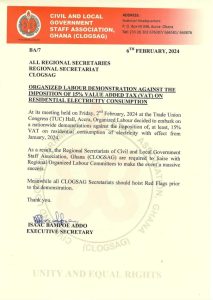In a bold move against the recent imposition of a 15% Value Added Tax (VAT) on residential consumption of electricity in Ghana, organized labor, spearheaded by the Trade Union Congress (TUC), has decided to embark on nationwide demonstrations. The announcement, made at the Congress (TUC) Hall in Accra, has sent shockwaves through the labor community, prompting a call for unity and action against what is perceived as a burdensome tax.
Background:
The decision to impose a 15% VAT on residential electricity consumption took effect from January 2024, drawing strong criticism from various quarters, including organized labor. Recognizing the potential impact of this tax on the already burdened citizens, labor unions have mobilized to voice their concerns and stand up for the rights of the working class.
Organizing for Impact:
To ensure the success of these nationwide demonstrations, the Regional Secretariats of the Civil and Local Government Staff Association, Ghana (CLOGSAG) have been called upon to collaborate with Regional Organized Labour Committees. This collaborative effort aims to create a united front against the imposition of the 15% VAT, demonstrating the strength and solidarity of the organized labor force.
The Role of CLOGSAG:
CLOGSAG, as a key player in the labor movement, holds a crucial role in orchestrating this widespread protest. The call for collaboration between CLOGSAG Secretariats and Regional Organized Labour Committees emphasizes the need for a coordinated and well-organized response to make the event a massive success.
Hoisting the Red Flag:
As a symbolic gesture of resistance and unity, all CLOGSAG Secretariats are instructed to hoist Red Flags prior to the demonstration. The Red Flag, a traditional symbol of workers’ struggle and solidarity, serves as a powerful visual representation of the collective voice rising against the imposition of the 15% VAT on residential electricity consumption.
The Importance of Solidarity:
These nationwide demonstrations go beyond merely opposing a tax; they symbolize the collective determination of the organized labor force to protect the interests and well-being of the working class. The solidarity demonstrated through such actions sends a clear message to policymakers and the wider public about the significance of fair and just economic policies.
Conclusion:
The decision to impose a 15% VAT on residential electricity consumption has sparked a nationwide call to action within the organized labor community in Ghana. As the Regional Secretariats of CLOGSAG collaborate with Regional Organized Labour Committees, the stage is set for a powerful and impactful demonstration against this taxation policy. The hoisting of Red Flags serves as a visible sign of resistance, symbolizing the unity and strength of the labor force in their quest for a fair and equitable economic landscape. The coming together of organized labor in this nationwide movement demonstrates the unwavering commitment to safeguarding the rights and well-being of the working class in Ghana.


